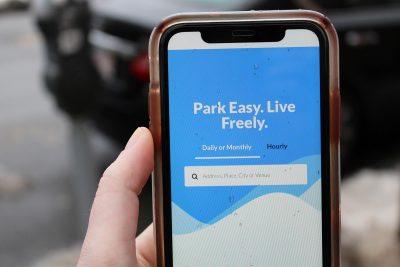At BostonHacks 2018, Amal Radhakrishnan, Oindrilla Chatterjee and Ashwin Pillai — then computer science graduate students at Boston University — were reflecting on their unpleasant experiences with parking.

“That’s when we realized all of us had experiences with parking and majority of them were not very pleasant,” Radhakrishnan said. “A lot of it was borderline frustrating and annoying, so that’s when we came up with our idea.”
During the hackathon, in a 36-hour period, they crafted a “demo platform,” then called ParknGo — a platform for people to rent and host parking spots — which won them several prizes, including the BU’s Spark! Innovation Fellowship.
In 2019, they launched Parkaze, a web platform and app allowing users to host and rent out privately owned parking spaces in the greater Boston area and Brooklyn, New York.
Radhakrishnan, who graduated from BU in 2019, said Parkaze helps “anyone who has access to parking real estate but who is not in the parking business,” manage and monetize those parking spots to a consumer base.
Parkaze is, in a way, “the Airbnb for parking,” he said.
He said Parkaze primarily focuses on helping groups such as property management companies and religious institutions rent their parking. Radhakrishnan said the pandemic helped encourage this shift from private parking spaces.
“That’s one of the main reasons we focused on such institutions,” he said, “who is in need of the most for that extra stream of revenue, as well as who has that additional resource in parking real estate.”
Radhakrishnan said Parkaze offers assistance with price determination, marketing, payment and verifying renters’ identities.
The majority of the app’s parking spaces in the Boston area are business-focused, he said. When it comes to the site’s user base of around 300 people, he added, most are young working professionals, including some graduate students.
Radhakrishnan said the platform is free to use and open to everyone.
“At the end of the day, the platform is open to anyone,” he said. “It’s a free-to-use platform, anyone can come into the platform and host their parking spaces.”
While creating the platform, Radhakrishnan said the process was very spontaneous.
“We did not start with an idea of starting a startup,” he said. “It just happened to happen. I think one of the main important things is being together with the people that you want to be together with and building something, solving a problem.”
Radhakrishnan said BU’s resources helped the trio bring their idea to fruition. The Spark! Fellowship, he said, helped them grow their idea into a product, and connected them to people in the technology industry.
Radhakrishnan added the BU and MIT Startup Law Clinic helped them form a Limited Liability Company and then a C-corp.
Director of BU Spark! Ziba Cranmer said the fellowship is a “technology incubator and experiential learning lab” specifically for computer science and engineering-based projects working to solve a problem.
“We really helped them hone in on both the feasibility from a technical perspective,” Cranmer said, “but also the desirability, in terms of what are the preferred features of that problem and how is it different from what’s already being solved.”
Cranmer said she advises rising entrepreneurs to look introspectively when thinking of their own ideas.
“A great place is to just think about your life, think about a day, think about a week and think about the moments that you have repeated annoyances with,” she said, “and that you might want to find a solution to that’s really accessible.”
For Radhakrishnan, he said he wants BU Terriers to know there is always a way to make something happen.
“More often than not,” he said, “all it takes is to just reach out and interact with the community.”














